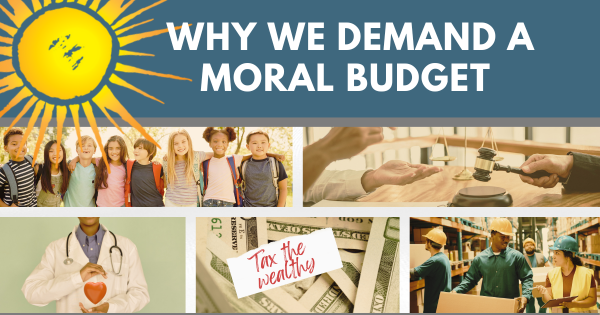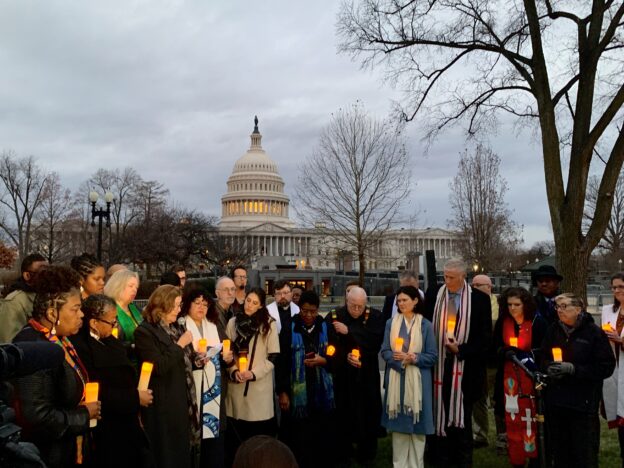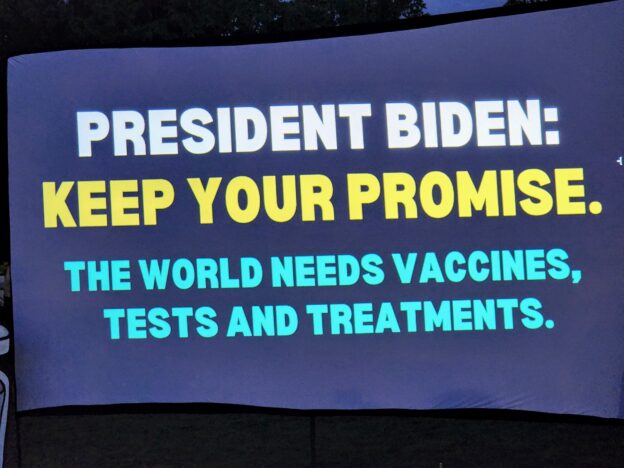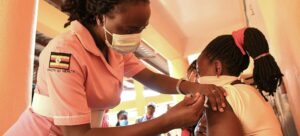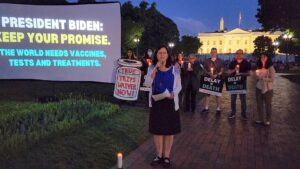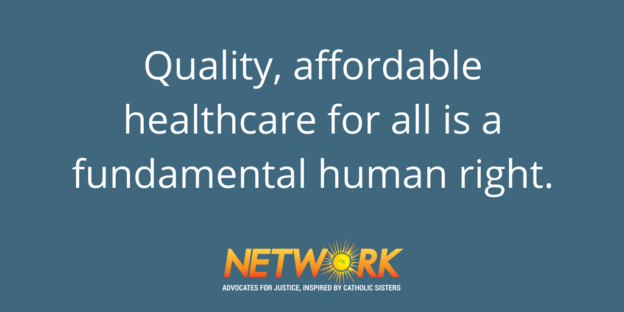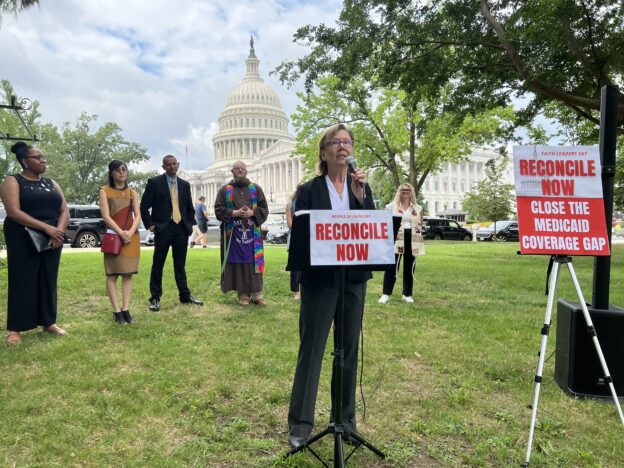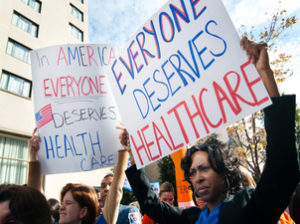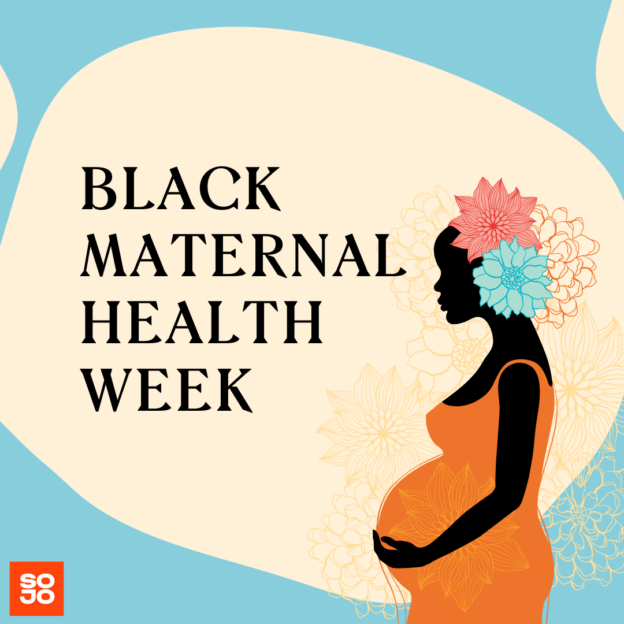
A Moral Budget Will Bring Thriving Communities
JoAnn Goedert, Ignatian Volunteer Corp Member
Government Relations Special Contributor
April 5, 2023
Our federal budget can reveal the respect and care we have for each other. As Mary Novak, NETWORK Lobby’s Executive Director, reminds us, “Budgets are moral documents; how we tax and how we spend reveals a set of moral choices.” President Biden has delivered a hopeful and optimistic vision for the country in his Fiscal Year 2024 (FY24) Budget. With few exceptions, President Biden’s budget embodies moral choices, and sets legislative goals, that can advance NETWORK’s Build Anew agenda. A moral budget will cultivate thriving communities nationwide.
Build Anew can bring us to an inclusive, multiracial, and multi-faith democracy. The transformative policy agenda envisions basic economic security, education, criminal justice, health care, and more — for everyone, no exceptions. Build Anew calls for all of us to have the freedoms and resources we need to live thriving lives. This requires policies and programs that ensure the wages and work conditions that American workers need to pay their bills, enjoy family life, and retire with dignity. Too often, wealthy corporations choose not to pay workers for the true value of their work and refuse to pay our country what they truly owe in taxes. In his budget, President Biden commits to offer workers and their families the tools they need to thrive and to finally make wealthy people and corporations pay what they truly owe through taxes.
Read on to see where NETWORK’s Build Anew policy agenda is present in President Biden’s budget to see why we are confident a moral budget will bring thriving communities
CRITICAL INVESTMENTS IN FAMILIES, CHILDREN, AND COMMUNITIES
President Biden’s budget boldly includes critical human investments that the NETWORK community has long advocated to help individuals, families, and children achieve economic security and thrive.
Expanded Child Tax Credit (CTC)
Millions of families were struggling to make ends meet when the American Rescue Plan was passed and expanded the CTC, allowing millions of parents to achieve financial stability and care for their children. That provision alone cut child poverty in half in 2021, to the lowest level in history. The expanded CTC: 1) increased benefit levels, particularly for young children; 2) expanded access to reach children in families with the lowest incomes who were formerlyleft out; and 3) paid benefits in monthly installments.
The expanded CTC has expired, and bringing it back is a moral and an economic imperative. NETWORK is heartened to see that it is a key element in the Biden Budget.
Permanently Expands the Earned Income Tax Credit
The FY24 budget also calls on Congress to permanently expand the EITC for childless workers. The expanded EITC was part of the American Rescue Plan and has expired. This provision helped younger workers and older workers without children and who did not previously qualify for the credit to emerge from poverty. The expansions ensured no low-wage workers were taxed into poverty. Permanently expanding the EITC and the improvements in the Child Tax Credit are two priorities this year.
Paid Family and Sick Leave
President Biden’s budget proposes a national paid family and medical leave program that would at last provide up to 12 weeks of paid leave for workers. The budget also calls on Congress to pass legislation requiring employers to provide seven paid sick days to all workers.
IMPROVED ACCESS TO AFFORDABLE HEALTH CARE
The president’s budget includes a range of proposals to improve access to high-quality, affordable health care, some of which have been integral elements of the Build Anew agenda:
Funding to Improve Black Maternal Health
The United States has the highest maternal mortality rate among developed nations, and rates are disproportionately high for Black women. A Black maternal health crisis has left black women three to four times more likely to die of pregnancy-related causes than white women. It doesn’t have to be this way–more than half of these deaths are preventable! We know what we need to do so that more Black mothers and their babies can thrive. The 2021 Black Maternal Health Momnibus Act offered a comprehensive roadmap for addressing the racial inequities that underlie this health crisis. NETWORK lobbied vigorously for this bill, but it failed to pass in the last Congress. We are pleased to see that the president’s FY24 budget includes $471 million to expand maternal health initiatives and requires all states to provide continuous Medicaid coverage for 12 months postpartum, eliminating gaps in health insurance at a critical time.
Permanent Affordable Care Act (ACA) Premium Reductions and Expansion to Medicaid
The budget builds on the remarkable success of the Affordable Care Act (ACA), by making permanent the average $800 per year premium cuts through expanded premium tax credits that the Inflation Reduction Act extended. It also provides Medicaid-like coverage to individuals in states that have not adopted Medicaid expansion under the ACA, paired with financial incentives to ensure states maintain their existing expansions.
The FY24 budget invests $150 billion over 10 years to improve and expand Medicaid’s home and community-based services which would allow older Americans and individuals with disabilities to remain in their homes and stay active in their communities as well as improve the quality of jobs for home care workers.
The budget also shores up funding for community health centers—which provide comprehensive services regardless of ability to pay, and which serve one in three people living in poverty and one in five rural residents.
Reduced Prescription Drug Costs
The budget calls for strengthening the newly established drug negotiation power in Medicare by extending it to more drugs and bringing drugs into negotiation sooner after they launch. And there’s a proposal to limit Medicare Part D cost-sharing for high-value generic drugs used for certain chronic conditions like hypertension and high cholesterol to no more than $2.
Saving Medicare for the Future
President Biden’s budget will ensure Medicare is fully funded until at least 2050. It does this by increasing the Medicare tax rate on investment income above $400,000 to 5% from 3.8%, by closing a tax loophole that lets some wealthy business owners avoid this tax, and by expanding Medicare’s ability to negotiate prescription drug prices. Not a penny in benefits will be cut.
EXPANDED ACCESS TO FOOD, HOUSING, AND EDUCATION FOR MARGINALIZED COMMUNITIES
The Build Anew agenda recognizes that, before marginalized individuals, families and communities can thrive, adequate food, housing, and educational opportunities are essential. The FY24 budget shares that recognition and proposes important steps to expand access in these critical areas:
Full Funding of Maternal and Child Nutrition Programs
The Biden Budget includes $6.3 billion for the Special Supplemental Nutrition Program for Women, Infants, and Children (WIC) and provides over $15 billion for States and local schools to expand free school meals to an additional 9 million children.
Housing
The Budget includes $59 billion in mandatory funding and tax incentives to incentivize local governments to address the critical shortage of affordable housing in communities throughout the country. By expanding the supply of housing, the budget would help curb cost growth across the broader housing market.
In the budget, the Housing Choice Voucher (HCV) program expands the current capacity of 2.3 million low-income families with rental assistance to obtain housing in the private market. The budget provides $32.7 billion to maintain services for all currently assisted families and expand assistance to an additional 50,000 households, particularly those who are experiencing homelessness or fleeing, or attempting to flee, domestic violence, or other forms of gender-based violence.
Protecting Foster Care Kids and Veterans
To further ensure that more households have access to safe and affordable housing, the budget includes mandatory funding to support two populations that are particularly vulnerable to homelessness—youth aging out of foster care and extremely low-income (ELI) veterans. The budget provides $9 billion to establish a housing voucher program for the 20,000 youth aging out of foster care annually and $13 billion to incrementally expand rental assistance for 450,000 ELI veteran families, paving a path to guaranteed assistance for all who have served the Nation and are in need.
Improved Access to Education for Low Income Students
The budget increases Title I funding to schools in low-income communities by $2.2 billion and increases Pell Grants by $500. It also offers funding to expand free community college and two years of subsidized tuition to low- and middle-income students attending Historically Black Colleges and Universities and other minority-serving institutions.
Funding for Workforce Training for Good Jobs
The Biden budget proposes an investment of over $600 million in training programs, especially for workers of color, women, and those living in rural areas, targeted at good-paying jobs in high demand industries and professions.
PROTECTING DEMOCRACY AND THE FREEDOM TO VOTE
As NETWORK advocates for the common good, we know that economics alone will not assure that communities, families, and children can flourish. At the foundation of the Build Anew Agenda is the understanding that all of us, regardless of our race or class, must have a secure right to vote and to be safe in our homes and communities, and to thrive with dignity.
Democracy
The assault on our democracy continues with former President Trump’s “Big Lie” about 2020 election results continuing to manifest itself in the degradation of confidence in and security of our elections processes. NETWORK is pleased to see that the budget proposes $5 billion in new election administration and Civil Rights Division oversight funding to be allocated over 10 years. This investment would assure that poll workers and elections authorities have the proper resources to aid in strengthening election integrity and security until Congress can pass robust voting rights and election security legislations, like the Freedom to Vote Act and the John Lewis Voting Rights Advancement Act.
Criminal Justice Advancement
Unfortunately, the budget seeks to revive ineffective 1990s policies by calling for the funding of 100,000 new police officers among other unbridled funding without specific accountability measures. Yet, we are thankful for the $5 billion over 10 years for community violence interventions, $409 billion allotted for key investments furthering First Step Act implementation, and the Board of Prisons and Department of Labor collaboration for training and other programs for citizens returning from federal prisons. Black, Brown, and Indigenous communities across our country continue to be plagued by police abuse and violence. Too often, interactions with law enforcement result in harm or death–often when the victim is unarmed or running away. The deaths of George Floyd, Sandra Bland, Tyre Nichols, Breonna Taylor and many others murder because of racial violence in God’s beloved community, must be mitigated by evidence-informed interventions to keep all people safe and reduce our reliance on the criminal-legal system. Data-driven community policing and safety solutions must be codified into federal law by Congress.
MAKING THE WEALTHY PAY WHAT THEY OWE
All of us agree that contributions made into our shared economy should be equitable. For too long, politicians have allowed wealthy people and businesses to pay less than what they owe in taxes, and at the same time, they’ve shamed people working low wage jobs for being a drain on the United States. When billionaires enjoy relatively no tax burden, but middle-class and working-class Americans pay what they owe into our shared economy, that is the true drain on taxpayers – that is economic injustice!
The Biden budget includes calls for the wealthiest U.S. individuals and corporations to finally pay their fair share, while ensuring that no on making less than $400,000 a year will pay more in taxes. In a series of proposals, the budget would institute a minimum tax on billionaires, raise the corporate tax rate and end offshore tax breaks, repeal the Trump tax cuts that provides windfalls to the top one percent, and cut wasteful federal spending on Big Oil, Big Pharma and other wealthy special interests. This stands in sharp contrast to MAGA Republicans in the House and Senate that have proposed to slap a 30% national sales tax on everything Americans buy, from groceries to healthcare to cars.
Biden’s budget also prioritizes tax enforcement resources to keep watch on rich and corporate tax cheats. To be clear, those who shirk their responsibility to our shared economy by evading hundreds of billions of dollars in taxes they owe every year. Republicans have voted to slash that funding to give rich tax cheaters a free ride. The resulting loss of revenue will actually increase the deficit by more than $100 billion.
NETWORK CAUTIONS AGAINST UNWARRANTED SPENDING
Unfortunately, the FY24 budget proposes increases in wasteful military spending, as well as additional funding on immigration enforcement, expanding militarization of the border that offers no solution to the situation there and can only compound the suffering of migrants seeking a safer, better life in the U.S.
Such measures fly in the face of both the Biden Administration stated vision for our country and NETWORK’s Build Anew agenda.
THE OPPOSITION TO BIDEN’S BUDGET
Following President Biden’s State of the Union speech in February 2023, the House Budget Committee was quick to announce a series of drastic cuts to fundamental economic security programs that provide a lifeline for our families, children, and marginalized communities. The GOP proposal would target basic food assistance, including SNAP, affordable health care, student loans, migrant legal services, and projects that protect the environment and reduce the impact of climate change. In the name of deficit reduction, these proposals may well make the thriving lives that Build Anew calls for an impossibility.
Not surprisingly, the MAGA Republicans reacted to the Biden budget with words of contempt, a vow to prevent its enactment, and redoubled calls for deep cuts to essential poverty prevention programs and environmental protections. At the same time, they have begun maneuvers to continue the Trump tax cuts for the wealthy.
Friends, the choice is clear for justice-seekers: we must act to reject House MAGA Republican initiatives that will deprive people of the ability to earn a wage that supports a thriving life, ensures health care that is affordable and accessible, and allows families to climb out of poverty.
We are working for a country where children have enough food to eat, our homes are , and everyone can afford life-saving prescriptions.
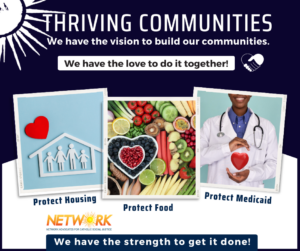 NETWORK staff and supporters have helped families thrive before by advocating for the expanded CTC and access to affordable housing, food, and other initiatives to advance the Build Anew agenda. We must work together again, through your advocacy and our lobbying, so that children, and their parents, guardians, and communities have the support they need.
NETWORK staff and supporters have helped families thrive before by advocating for the expanded CTC and access to affordable housing, food, and other initiatives to advance the Build Anew agenda. We must work together again, through your advocacy and our lobbying, so that children, and their parents, guardians, and communities have the support they need.







